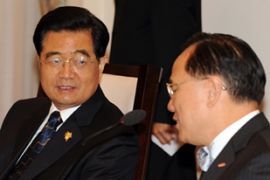Apec rejects trade protectionism
Obama calls on Myanmar to free Aung San Suu Kyi during meeting on trade and climate.

However, no final binding agreement on targets was reached.
“We … reaffirm our commitment to tackle the threat of climate change and work towards an ambitious outcome in Copenhagen,” the statement said.
Emission target dropped
A caveat pledging to halve greenhouse gas emissions by 2050 set in an earlier draft was dropped from the final statement.
“There was an assessment by the leaders that it was unrealistic to expect a full, internationally legally binding agreement to be negotiated between now and when Copenhagen starts in 22 days,” Mike Froman, the US deputy national security adviser, said earlier.
| in depth | |||||||||||
|
Barack Obama, the US president, was one of 21 heads of state in attendance, along with Hu Jintao and Gloria Arroyo, the Chinese and Philippine presidents respectively, and Kevin Rudd, the Australian prime minister.
Lars Loeke Rasmussen, the Danish prime minister, made a surprise visit to meet with leaders on the sidelines of the summit.
“There was, I’d say, a general consensus of support for what prime minister Rasmussen laid out, which is… ‘one agreement, two steps’ where Copenhagen would be the first step in a process towards an internationally legally binding agreement,” Froman said.
He said Rasmussen told the meeting that “in Copenhagen, he would seek to achieve a politically binding agreement that covered all the major elements of the negotiations, including mitigation, adaptation, technology, and finance”.
“I think there was widespread support among the leaders that it was important that Copenhagen be a success, that there would be the achievement of real, concrete progress in Copenhagen with operational impact,” he said.
Veronica Pedrosa, Al Jazeera’s correspondent at the summit, said a political deal would be backed rather than binding climate change targets.
Myanmar discussion
Later in the day, Obama called on Myanmar to free Aung San Suu Kyi, the free pro-democracy leader, during an unusual face-to-face interaction with a senior leader of the ruling military.
He delivered the message during a summit meeting which included General Thein Sein, Myanmar’s prime minister.
Robert Gibbs, the White House press secretary, said Obama called on Myanmar to free Suu Kyi and other political prisoners, and end oppression of minorities.
“Obama brought that up directly with that government,” he said, indicating that the president addressed Thein Sein.
Obama, in a broad policy speech in Tokyo on Saturday, also made a point of mentioning Suu Kyi by name.
Before the summit, the 11 leaders gathered for a photo shoot for a few minutes, but Obama and Thein stayed far from each other and made no contact of any sort.
‘Two-pronged approach’
Obama is the first US president in 40 years to meet a Myanmar leader.
Surin Pitsuwan, Association of Southeast Asian Nations (Asean) secretary-general, told Al Jazeera: “The US is making the two-pronged approach that is dialogue and keeping all other options open – including pressure and sanctions.
“The potential is great. It depends on how we handle this new, more open [approach] from the US towards Asean nations.”
It was announced that the US state of Hawaii will host the 2011 summit.
